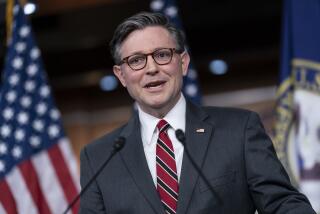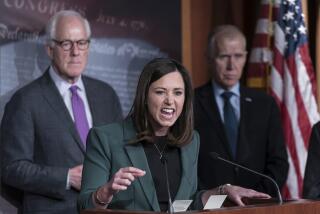Reagan Shifts Tactics, Woos Democrats on Contra Aid : Emphasizes Bipartisan Approach
- Share via
WASHINGTON — President Reagan softened his approach to recalcitrant Democrats today and urged them to support aid for Nicaraguan rebels as a sign that Congress and the Administration are joined in an “anti-communist coalition.”
“What we’re seeing is the end of the post-Vietnam syndrome--the return of realism about the communist danger,” Reagan declared as he stepped up his drive for the $100-million aid package. “And now, we’re ready for the final act.”
“The importance of this moment cannot be underestimated,” he said. “Think what signal we’ll be sending to the rest of the world when and if this aid to the freedom fighters in Nicaragua is passed.”
Shifting from the politics of confrontation to a theme of cooperation in what he conceded is “an uphill battle,” Reagan told 200 conservative supporters that “the tide is turning” in favor of his plan to arm the rebel contras.
‘Paramount Importance’
“This is not a narrow partisan issue,” he said. “It’s a national security issue of paramount importance: whether the Soviet Union will be able to establish a subversive base camp and military beachhead on the mainland of North America.”
Asked why Reagan thinks “the tide is turning” on Capitol Hill, presidential spokesman Larry Speakes said the White House was encouraged by support last week from some influential House Democrats.
At the same time, Speakes played down talk of compromise stirred a day earlier by Reagan’s remark that he would be “willing to talk about how we can get practical aid” to the contras. (Story on Page 4.)
Insisting that Reagan “is in the same position he was last week” and will continue to fight for the full aid package, Speakes said, “We don’t want any halfway measures.”
Cites Bipartisanship
After a week that saw the White House frame the aid question as an issue of patriotism and party, Reagan asked Democrats today to close their eyes to politics and support him in the spirit of past bipartisan backing for his defense buildup, aid to democracies in Central America and insurgent movements in Angola and Nicaragua.
Invoking the advice of the late Sen. Henry M. Jackson (D-Wash.) that “in matters of national security, the best politics is no politics at all,” Reagan veered from the combative approach orchestrated last week by his communications director, Patrick Buchanan.
“The events of the last three or four years have seen the slow reconstruction of that anti-communist coalition--that bipartisan consensus on foreign policy that once existed on Capitol Hill,” Reagan said.
One indication of the reaction abroad came from Colombian President Belisario Betancur, who told the Washington Post that the request for military and non-lethal aid to the contras is wrong and “will not produce good results.”
‘More Through Negotiation’
“I know we can get more through negotiation,” said Betancur, a leader of the four-nation Contadora group that is promoting a negotiated settlement of the conflict in Central America.
Speakes, however, said polls show widespread support in two other countries--Honduras and Costa Rica--for the controversial stand Reagan has taken against the Marxist-led Sandinista regime in Nicaragua.
As part of the campaign for the contra aid, the State Department released a report containing allegations by a Sandinista defector of human rights abuses, propaganda and drug trafficking by the Nicaraguan government.
The hard sell will be augmented by emphasis on diplomacy as Reagan lobbies Congress in public and private, leading up to a televised address to the nation Sunday evening.
More to Read
Sign up for Essential California
The most important California stories and recommendations in your inbox every morning.
You may occasionally receive promotional content from the Los Angeles Times.













